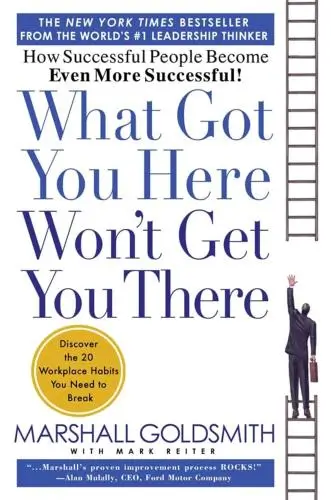What Got You Here Won't Get You There
How Successful People Become Even More Successful
What's it about?
What Got You Here Won't Get You There is a self-help book that challenges successful individuals to reevaluate their behaviors to reach even greater heights. Goldsmith emphasizes that past success does not guarantee future success and outlines key habits that may be holding you back. Through insightful anecdotes and practical advice, the book teaches readers how to overcome common pitfalls such as arrogance, negativity, and withholding information. By implementing Goldsmith's strategies, readers can unlock their full potential and continue on the path to success.
About the Author
Marshall Goldsmith is a leadership coach and author, specializing in business education and behavioral change. He is known for his stakeholder-centered coaching technique and best-selling books like "What Got You Here Won’t Get You There." Goldsmith's work emphasizes practical strategies for achieving personal and professional success.
10 Key Ideas of What Got You Here Won't Get You There
Stop Making Excuses for Your Behavior
Making excuses for your behavior, especially when it negatively impacts others, undermines your credibility and hinders personal growth.
Recognizing and owning up to your mistakes allows you to learn from them, build trust with colleagues, and demonstrate leadership maturity.
It's crucial to understand that accountability is a cornerstone of effective leadership and personal development.
Learn DeeperAcknowledge Your Mistakes Promptly: When you realize you've made a mistake, especially one that affects others, don't wait. Address it immediately with those involved. This shows you're aware of the impact of your actions and are taking responsibility.
Seek Feedback Regularly: Make it a habit to ask for feedback from your peers, subordinates, and superiors. This not only helps you identify areas for improvement but also demonstrates your commitment to personal growth and accountability.
Reflect Daily: Spend a few minutes at the end of each day reflecting on your actions and their outcomes. Ask yourself what went well, what didn’t, and how you can improve. This practice helps in recognizing patterns in your behavior that may need change.
Set Personal Accountability Goals: Identify specific behaviors you want to change or improve. Set clear, measurable goals for these changes and track your progress. Celebrate small victories to motivate yourself along the way.
Apologize Sincerely When Necessary: If your actions have negatively impacted someone, offer a sincere apology without making excuses. This can help repair relationships and build trust.
- Example
If you're late to a meeting that you're leading, instead of blaming traffic or unforeseen circumstances, acknowledge the inconvenience caused to others. Start by saying, 'I apologize for being late and appreciate your patience. Let’s make the most of our remaining time.'
- Example
After receiving feedback in your annual review that your communication style can be abrupt and sometimes off-putting, instead of getting defensive, thank the person for their honesty. Then, work on developing a plan to improve your communication skills, perhaps by attending workshops or seeking mentorship.
Cease the Need to Have the Last Word in Every Discussion
Constantly needing to have the last word can alienate colleagues and stifle open communication within a team.
It signals a lack of respect for others' opinions and a potential inability to listen effectively.
Cultivating an environment where all voices are heard and valued encourages diverse perspectives and leads to more innovative solutions.
Learn DeeperPause Before Responding: Make it a habit to take a brief pause before you reply in conversations. This gives you time to consider if what you're about to say is adding value or if you're just trying to have the last word.
Ask Open-Ended Questions: Instead of jumping in with your opinion, ask others what they think about the topic. Questions like 'What are your thoughts?' or 'How do you see it?' encourage dialogue and show that you value their input.
Practice Active Listening: Focus on really hearing what the other person is saying, rather than formulating your response while they speak. Nodding, maintaining eye contact, and paraphrasing what they've said are good ways to demonstrate active listening.
Acknowledge Others' Contributions: Make it a point to acknowledge and appreciate the contributions of others in discussions. A simple 'That's a great point, thank you for bringing that up' can go a long way in fostering a collaborative environment.
- Example
In a team meeting, when a colleague presents an idea that differs from yours, instead of immediately countering it to have the final say, you could respond with, 'That's an interesting perspective. Can you tell us more about how you arrived at that conclusion?'
- Example
During a family discussion about planning a vacation, instead of insisting on your preferred destination, you could ask, 'What does everyone else think? Are there places you'd love to visit? Let's make a list and discuss the pros and cons of each.'
Eliminate Negative Comments About Others
Negative comments about others can create a toxic work environment, erode trust, and diminish team morale.
Focusing on positive communication and constructive feedback fosters a supportive culture that encourages growth and collaboration.
Remember, building others up rather than tearing them down strengthens relationships and enhances team dynamics.
Learn DeeperPause Before You Speak: Make it a habit to take a brief moment to consider the impact of your words before you speak about someone else. Ask yourself if what you're about to say is constructive, necessary, and true.
Implement a Positive Feedback Routine: Start meetings or conversations by sharing something positive about a team member's work or attitude. This sets a constructive tone and encourages others to look for the good in their colleagues.
Practice Active Listening: When discussing issues or conflicts, focus on listening more than speaking. This helps to understand the situation fully and respond with empathy and constructive feedback, rather than jumping to negative conclusions.
Challenge Negative Thoughts: When you catch yourself having a negative thought about someone, challenge it. Try to find a positive angle or understand the context behind their actions. This can help shift your perspective from criticism to empathy.
Encourage Peer Recognition: Create opportunities for team members to acknowledge each other's contributions and successes. This could be through a dedicated time in meetings, an internal newsletter, or a recognition board.
- Example
During a team meeting, instead of pointing out a colleague's mistake in front of everyone, you privately discuss the matter with them afterwards. You start by mentioning something they did well recently, then gently bring up the mistake and offer help or solutions.
- Example
When you overhear a conversation where colleagues are being criticized, you intervene by redirecting the conversation towards finding a solution or understanding the challenges faced by the person being criticized. You highlight their past achievements or strengths to balance the perspective.
Stop Making Destructive Comments
Destructive comments, even if meant as jokes, can hurt others and damage relationships.
It's important to communicate with empathy and consideration, understanding the impact your words may have.
Constructive communication promotes a positive and inclusive environment, encouraging open dialogue and mutual respect among team members.
Learn DeeperPause Before You Speak: Before making a comment, especially in a professional setting, take a moment to consider its impact. Ask yourself if it's constructive, necessary, and how it might be received by others.
Practice Empathy: Try to understand things from the other person's perspective. Before commenting, think about how you would feel if someone said the same to you. This can help in framing your words more kindly and effectively.
Seek Feedback: Occasionally, ask your colleagues or friends for feedback on how you communicate. This can provide insights into how your comments are perceived and areas where you might need to improve.
Apologize When Necessary: If you realize that a comment you made was hurtful or inappropriate, don't hesitate to apologize sincerely. Acknowledging your mistake can go a long way in mending and strengthening relationships.
- Example
In a team meeting, instead of saying 'That idea won't work,' you could pause, consider your words, and then say, 'It's an interesting idea. Can we explore how it might work in conjunction with our current strategy?'
- Example
After making a joke that seemed to fall flat, noticing a colleague's discomfort, you could later approach them and say, 'I realized my comment earlier might not have come off as intended. I'm sorry if it was inappropriate or made you uncomfortable.'
Let Go of the Past to Move Forward
Holding onto past successes or failures can hinder your ability to embrace new opportunities and challenges.
The landscape of business and leadership constantly evolves, requiring adaptability and a forward-thinking mindset.
Embracing change and learning from both successes and failures are key to continuous improvement and achieving future goals.
Learn DeeperReflect on Your Past, But Don't Dwell: Set aside time each week to reflect on what you've learned from both your successes and failures. Use this reflection to inform your future actions, but don't let it hold you back from trying new approaches.
Set Clear, Forward-Thinking Goals: Regularly update your goals to reflect your current aspirations, not just past achievements. Make sure these goals challenge you to step out of your comfort zone and embrace change.
Seek Feedback and Embrace Learning: Actively seek feedback from peers, mentors, and team members. Use this feedback to identify areas for improvement and commit to continuous learning through courses, reading, or new experiences.
Practice Adaptability: When faced with new challenges or changes in your environment, practice responding with flexibility. Consider different strategies and be willing to pivot your approach based on what the situation requires.
- Example
A manager who led a successful project using a specific methodology in the past might find that a new project requires a completely different approach due to changes in technology or team composition. Instead of insisting on using the old methodology, the manager could explore and implement new strategies that better suit the current project's needs.
- Example
An entrepreneur who failed in a previous venture due to market conditions might hold onto the belief that their product or idea was flawed. By objectively analyzing the failure to understand the external factors at play and adapting their business model, they can re-enter the market with a refined approach that addresses past shortcomings.
Deeper knowledge. Personal growth. Unlocked.
Unlock this book's key ideas and 15M+ more. Learn with quick, impactful summaries.
Read Full SummarySign up and read for free!
What Got You Here Won't Get You There Summary: Common Questions
Experience Personalized Book Summaries, Today!
Discover a new way to gain knowledge, and save time.
Sign up for our 7-day trial now.
No Credit Card Needed

Similar Books

The Decision Book
Mikael Krogerus
This is Going to Hurt
Adam Kay
The ^AOxford Handbook of Job Loss and Job Search
Ute-Christine Klehe PhD
Job Interviews For Dummies®
Joyce Lain Kennedy
Job Interviews In A Week
Alison Straw
Handbook of Career Development
Gideon Arulmani
The Company She Keeps
Georgia Durante
The Millionaire Fastlane
MJ DeMarco
Losing My Virginity
Richard Branson
Crush It!
Gary VaynerchukTrending Summaries

Peak
Anders Ericsson
Never Split the Difference
Chris Voss
Smart Brevity
Jim VandeHei
The Psychology of Money
Morgan Housel
The First 90 Days
Michael D. Watkins
Atomic Habits
James Clear
Thinking, Fast and Slow
Daniel Kahneman
The Body Keeps the Score
Bessel van der Kolk M.D.
The Power of Regret
Daniel H. Pink
The Compound Effect
Darren HardyNew Books

The White Night of St. Petersburg
Michel (Prince of Greece)
Demystifying Climate Models
Andrew Gettelman
The Hobbit
J.R.R. Tolkien
The Decision Book
Mikael Krogerus
The Decision Book: 50 Models for Strategic Thinking
Mikael Krogerus
Fichte
Johann Gottlieb Fichte
Do No Harm
Henry Marsh
This is Going to Hurt
Adam Kay
This Is Your Brain on Joy
Earl Henslin

